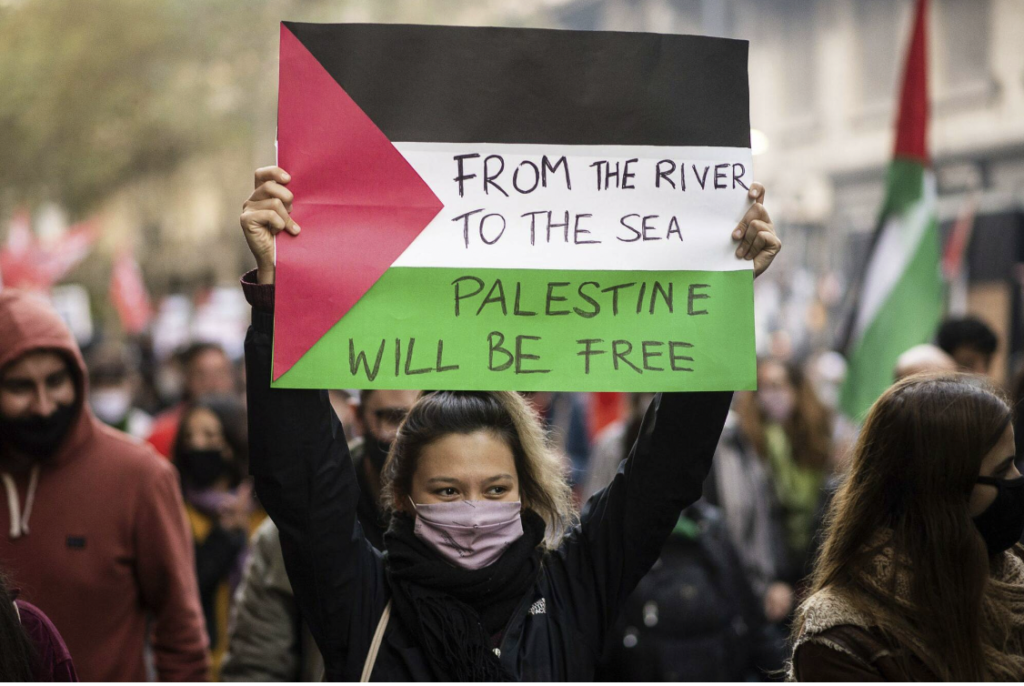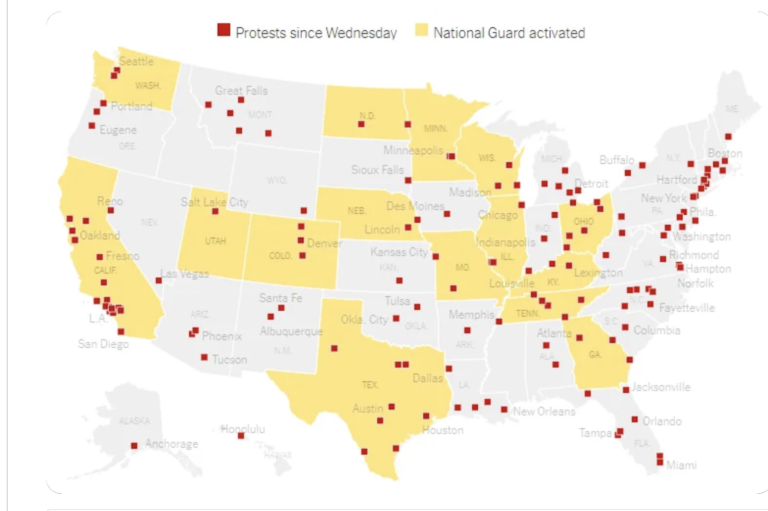By Andrea Tucci
For weeks many Western universities have seen demonstrations of support for the population of Gaza affected by the consequences of the Israeli attack after the Hamas massacre on 7 October.
These demonstrations, which began more or less peacefully, are asking of a cease-fire in Gaza.
As the days pass, the protest travels from America, including Canada, to Europe, in particular in France, Italy and England where there have been occupations and requests to interrupt collaborations with Israeli universities.
What is striking about the US protests is that they are proliferating in what are considered the most “selective” universities, those from which the country’s ruling class emerges: Columbia, Yale, New York University, Stanford, Berkeley.
On April 17, students at Columbia University formed a “Gaza Solidarity Encampment” calling for the school to divest from companies that profit from the occupation in Palestine. Their tents stood for two days before the administration suspended more than 100 participating students and asked the NYPD ( New York Police department) to dismantle the encampment. Unsurprisingly, the repression only increased the size and scope of the protest.
In short order, students at dozens of other colleges including the University of Minnesota, the University of Pittsburgh, have established similar encampments asking to cease-fire in Gaza.

Universities are responding in different ways. On April 24, the University of Texas at Austin, blocked the path of protesters and arrested at least 34 people for refusing to disperse.
Since October, universities have suspended student groups, curbed academic speech, and called the police on peaceful protesters on campuses coast to coast.
The Brown University campus has seen a series of escalating student protests calling for the university to divest its endowment from US companies that support the Israeli government. The administration has so far refused demands for divestment and punished student protesters in the process.
On April 22, Yale university Police entered a pro-divestment encampment on campus and arrested 44 student protesters were arrested for criminal trespassing.
In an academic year in which Cornell University has boldly proclaimed “Freedom of Expression” as its central theme, the university’s actions seem to have contradicted this pledge.
Since October 7, Cornell has been a hotbed of dissent. In the weeks following, the campus witnessed a surge of protests, die-ins, and occupations of campus buildings by pro-Palestine students demanding the divestment of Cornell’s financial involved in the Israeli military attacks on Gaza and the West Bank.
The birthplace of the Free Speech Movement of the UC Berkeley university has a well-deserved reputation for student activism. It’s no surprise then those students have organized daily protests, calling for an end to the university’s $2 billion investment in BlackRock, which has substantial corporate holdings in weapons manufacturers that arm the IDF (Israeli Force Defense).
The Massachusetts Institute of Technology (MIT) has reacted harshly to student protests in support of a ceasefire in Gaza, reflecting the institute’s long-standing ties to Israel. Since 2008, MIT labs have received millions of dollars in funding from the Israeli Ministry of Defense to conduct research on ballistic targeting, surveillance, cyber warfare and drone technology.
The university hosts events to connect students and faculty with weapons manufacturers such as Elbit, Raytheon, Caterpillar and BAE systems, which supply the Israeli army with drones, D9 bulldozers, fighter jets and artillery. Lockheed Martin (an American company specializing in aerospace, weapons and defense) even sponsors a $150,000 grant managed by MIT, to connect students with its weapons laboratories and offices in Israel. The institute’s response to the Palestinian protests was rather repressive. MIT police disrupted scheduled educational events and failed to intervene when provocateurs harassed or assaulted pro-Palestinian students.
The MIT community did not go down easy. On March 23, university students voted in a referendum calling for a ceasefire in Gaza and cutting research ties with the Israeli army.
Unlike some other campuses, the University of Cincinnati hasn’t been overtly repressive in its treatment of pro-Palestine organizers, but their environment is quietly hostile.
It’s the constant fear among college students about the very likely future repercussions: “Employers who won’t hire you, and doors that close in your face.”
University of Michigan students occupied the Ruthven administration building that houses President Santa Ono’s office. More than 40 students were arrested.
Representatives of the TAHRIR Coalition (a coalition of 80 organizations fighting for divestment from Israel) they were brutalized by the police, effectively endangering all students.
Since October 7, Columbia University has responded to pro-Palestine students and faculty with punitive measures like suspending Students for Justice in Palestine and Jewish Voice for Peace. Despite the administration’s numerous attempts to silence student activists. The university President Minouche Shafik requested NYPD officers to clear the encampment, leading to the arrests of over 100 students, followed by their immediate suspension. Columbia University has been consistently hostile to the press and has attempted to disrupt the broadcast of the university protests, since its inception.
McGill university in Canada, currently invests in companies such as Lockheed Martin, Chevron, Textron, and BAE Systems that provide Israel with military technology and advanced weaponry. Students are calling for McGill to cut ties with Israeli institutions, including ending courses that heavily subsidize students to visit Israel and work with Israeli tech startups.
Students at the City University of New York (CUNY) say the repression they are experiencing on campus for their pro-Palestinian advocacy begins with Governor Kathy Hochul. In December, Hochul sent a letter to New York university presidents threatening legal action against universities that failed to regulate anti-Semitism and calls for genocide of the Jewish people. Despite the call for peace, students involved with Students for Justice in Palestine at CUNY College in New York following Governor Hochul’s letter were directly threatened with suspension.
At Swarthmore college, pro-Palestinian protests initially went without much administrative push-back. Students chanting “From the river to the sea, Palestine will be free” were harshly disciplined by the university administration, with the threat of being expelled from college.
Rutgers University has continued to silence those who support Palestine, while maintaining an unwavering commitment to Israel.
By suppressing Palestinian voices, maintaining active relations with TAU (Tel Aviv University) and Israel, and refusing to denounce the killing of over 30,000 people in Gaza, the university administration has created an environment in which acts of violence have frequently occurred against Palestinians and Muslims.

In March, a student at Washington University (WASHU) in St. Louis passed a resolution calling on the university to divest from Boeing, the largest employer of WASHU alumni, as Boeing produces weapons for IDF (ISRAEL DEFENSE FORCE). In response, WASHU Chancellor Andrew Martin flatly rejected the possibility of any divestment.
To this day, many American universities have generally and rightly condemned the genocide of Jews and any other people, but have purposely failed to condemn the current genocide taking place in Gaza.
Their rhetoric reflects a double standard in which murders or acts of violence are always condemned, unless the perpetrator is the State of Israel.




